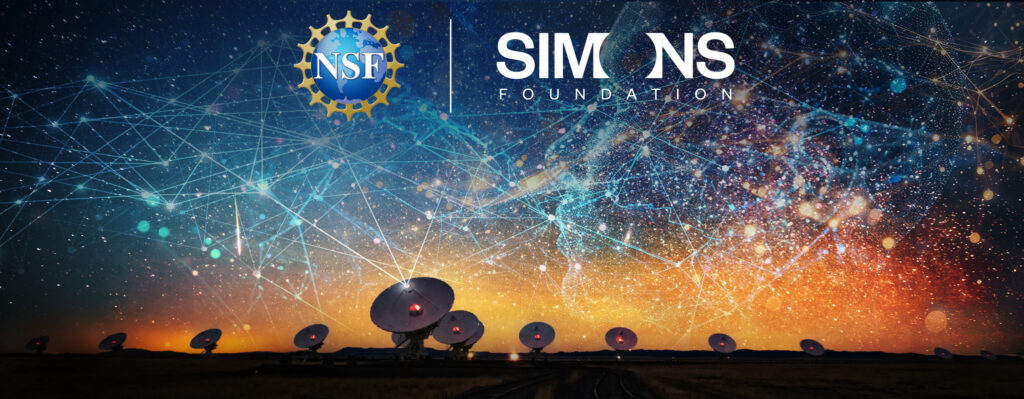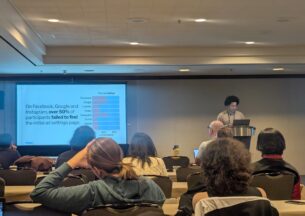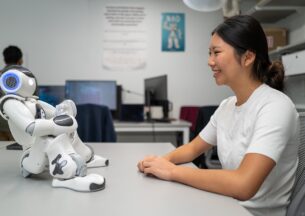NSF and Simons Foundation launch $20 million National AI Research Institute in Astronomy

A large multi-institutional collaboration, including the University of Chicago and led by Northwestern University, has received a $20 million grant to develop and apply new artificial intelligence (AI) tools to astrophysics research and deep space exploration.
 Jointly funded by the National Science Foundation (NSF) and the Simons Foundation, the highly competitive grant will establish the NSF-Simons AI Institute for the Sky (SkAI, pronounced “sky”). SkAI is one of two National AI Research Institutes in Astronomy announced today.
Jointly funded by the National Science Foundation (NSF) and the Simons Foundation, the highly competitive grant will establish the NSF-Simons AI Institute for the Sky (SkAI, pronounced “sky”). SkAI is one of two National AI Research Institutes in Astronomy announced today.
The new institute will unite researchers from multiple disciplines to develop innovative, trustworthy AI tools for astronomy, which will be used to pursue breakthrough discoveries by analyzing large astronomy datasets, transform physics-based simulations, and more. With unprecedentedly large sky surveys poised to launch, including from the Vera C. Rubin Observatory, astronomers will require smarter, more efficient tools to accelerate the mining and interpretation of increasingly large datasets. SkAI will play a crucial role in developing and refining these tools.
“The institute’s overarching goal is to bring together astrophysicists and AI researchers to solve fundamental challenges in astronomy that require critical advances in AI, thereby driving innovation and discovery in both fields,” said Professor and Chair of Astronomy and Astrophysics Joshua Frieman, Co-PI and Associate Director of Knowledge Transfer for SkAI. “While AI is increasingly part of our everyday lives, the institute will focus on developing AI tools that are reliable and trustworthy enough to be used for rigorous astronomy research, in the process training a new generation of interdisciplinary leaders.”
Envelope-pushing community
In addition to Frieman, UChicago’s SkAI leadership includes Professor of Statistics and Computer Science Rebecca Willett as Co-PI and Associate Director for Research (AI). Executive Director of the Data Science Institute David Uminsky will serve as Senior Personnel and Co-Lead for Undergraduate Education (Satellite Network) and Broadening Participation.
PSD faculty Rina Barber, John Carlstrom, Chihway Chang, Yuxin Chen, Alex Drlica-Wagner, Daniel Holz, Alexander Ji, Harley Katz, Sanjay Krishnan, Michael Maire, Jeff McMahon, Daniel Sanz-Alonso, and Abigail Vieregg will also play important roles in this new institute.
“The interdisciplinary nature of our team, which comprises astrophysicists, computer scientists, statisticians, and mathematicians who will work closely together on projects, will be critical to developing the bleeding-edge, foundational AI methods needed to tackle outstanding problems in astronomical data analysis, developing new astrophysical models, and designing future experiments,” said Willett.
Centrally located in Illinois, SkAI will unite 83 team members from across 25 partner organizations. The SkAI Institute will serve as an inclusive, cross-disciplinary nexus that will accelerate AI-astronomy research and help educate a diverse workforce.
“Illinois is already an international hub of research and technology, and our state is ideally positioned for greater investment, innovation, and job creation,” U.S. Senator Tammy Duckworth (D-IL) said. “I’m pleased to see NSF investing in our state with this new AI Institute for the Sky, helping deepen the scientific research and understanding of astronomy and astrophysics. Our state is making it clear that we are ready to compete and have the innovation and talent right here to bring our state, nation, and world into the future.”
“Artificial intelligence is changing the way we approach our world,” said U.S. Senator Dick Durbin (D-IL). “The SkAI Institute allows Illinois to lead the exploration of this technology’s possibilities and its use in astrophysics. Illinois’s world-class research universities have long worked alongside the NSF at the cutting edge of next-generation technologies. Thanks to collaborations like SkAI, our state will continue to lead the way in the industries of the future.”
Core partners of SkAI are Northwestern, the University of Chicago, the University of Illinois Urbana-Champaign, and the National Center for Supercomputing Applications, with other partners from Argonne National Laboratory, Fermi National Accelerator Laboratory, the University of Illinois Chicago, the Adler Planetarium, and the University of Wisconsin-Madison, as well as several undergraduate education and research institutions, and industry and art organizations. The team comprises researchers from diverse backgrounds, including experts from astrophysics, foundational AI, education, ethics, software engineering, and the arts.
Data-driven discoveries
Over the course of the next decade, the Vera C. Rubin Observatory will launch the Legacy Survey of Space and Time (LSST). The LSST will generate the widest, deepest images of the southern sky and create the first-ever deep, multicolor movie, showing how the sky changes over time. The project will generate dozens of terabytes of data per night, potentially holding answers to the universe’s most elusive secrets.
Frieman notes that “SkAI will use cutting-edge AI and powerful new sky surveys to help uncover the nature of dark energy, to understand what the rich tapestry of large-scale structure tells us about the early universe, to probe how galaxies, stars, and black holes formed and evolved over cosmic time, and to understand how compact objects give rise to a zoo of explosive and variable phenomena.”
While surveys like the LSST promise transformational advances in astrophysics and cosmology, they also require researchers to process an unprecedented amount of astrophysical information. New AI tools will be crucial to meeting this extraordinary challenge. To help the effort, the SkAI Institute will develop and deliver innovations at the intersection of astronomy and AI that transform the speed and reliability of simulations and optimize the design of instruments and surveys.
“Astronomy presents unique and exciting challenges at the forefront of AI, such as how to build generative models (like ChatGPT for text or Dall-E for images) that provide new insights into complex astrophysical phenomena,” said Willett. “Our interdisciplinary efforts will lead to new tools that allow researchers to quantify uncertainties associated with AI predictions, adjust to noisy and complex data gathered by multiple observatories, and accelerate simulations that model the origins of the universe.”
“The massive amount of data that will be gathered in the coming years by the Vera C. Rubin Observatory and other large-scale astronomical projects is simply too vast and rich to be fully explored with existing methods,” said Sethuraman Panchanathan, director of the NSF. “With reliable and trustworthy AI in their toolbox, everyone from students to senior researchers will have exciting new ways to gain valuable insights leading to amazing discoveries that might otherwise remain hidden in the data.”
Establishing an inclusive, diverse workforce
Scientific discovery and data processing are not the SkAI Institute’s only goals. All of the AI tools developed within the institute will be open source, for the whole community to use for research in astronomy and beyond. The new institute will also empower the entire astronomy community to use cutting-edge AI tools to address fast-evolving challenges and nurture an ethically aware and diverse generation of interdisciplinary leaders.
To help establish an inclusive culture and grow a larger, diverse STEM workforce, the SkAI team includes the SkAI Satellite Network, a set of 16 regional and national college partners, which include 13 minority-serving institutions and two EPSCoR (Established Program to Stimulate Competitive Research) institutions. An intentional effort to increase representation in the AI and astronomy fields, this work through SkAI Satellite Network will lower barriers to access for high school and college students by engaging both faculty and students from the Network in long-term mentoring and working partnerships to foster a research and learning culture, where all members can thrive.
Established in 2020 the National AI Research Institutes represent the U.S. government’s cornerstone commitment to fostering long-term, fundamental research in AI. The other National AI Research Institute in Astronomy is the NSF-Simons CosmicAI Institute, led by the University of Texas at Austin.
This article was originally published on the Physical Science Division website.














